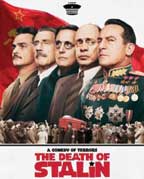The Death of Stalin Sheds Some Darkly Comedic Light on a Tumultuous Period in Soviet History

Let us take this moment in American history, marked as it is by internecine conflicts on both parties and the bellicosity possessed by certain strongmen of the “only I can save us” persuasion, to consider that history is irreconcilable. We’ll never know what is really happening behind closed doors, not because of what has been described over and over in the media as our sudden emergence into a “post-truth” world, as if the truth were a non-renewable resource which we have failed to conserve and have simply run out, but because history is something from which no one escapes. Everybody dies, and nobody lives to tell the tale.
Or such would seem to be the moral of The Death of Stalin, the latest pitch-black political satire from Armando Iannucci, the creator and writer of “In the Loop”, “Veep” and “The Thick of it.” Adapted from a French language graphic novel, the film attempts a reasonably believable reconstruction of the reshuffling of power following the death of Josef Stalin as various ministers, lackies and military men engage in some heavy-duty scheming.
One is Nikita Kruschev (unexpectedly, and compellingly, played by Steve Buscemi as a comparatively sensible but neurotic force for some self-serving reform), who sees the rolling back of Stalin-era abuses as a way to curry favor with the proletariat. Beria (Simon Russell Beale), the chief of the secret police apparatus, who the film is careful to remind us has overseen, or often, personally performed, the murder, rape, torture of thousands of Soviet citizens, is pursuing the same tact in an effort to blame the excesses of his cruelty on Stalinist politics and make himself look like a progressive. Then there’s Georgy Valenkov, Stalin’s deputy and the obvious choice for to ascend to the Premiership (Jeffrey Tambor), the highly decorated general Marshall Zukhov (Jason Isaacs) and old guard politicians like Molotov (the great Michael Palin) waiting in the wings for their turn.
None of which sounds very funny, but it very definitely is. But its comedy exists alongside a thick, black vein of darkness and violence – the lives of the Russian citizenry, colleagues and even their wives are all mutable in the fight for power, any of them subject at any moment to being chewed up and spit out in the power struggle. Many people are simply shot point blank. The film, for all its nihilistic laughs, never lets us forget the human cost of so much power-mongering.
In the end, it doesn’t so much matter if history happened the way it is recorded in “The Death of Stalin”. Because arguably more important than the “way it happened” is the “spirit of what happened”. And as “The Death of Stalin” turns out, inevitably and depressingly, to be about ourselves, I’d say that it more than succeeds as a hilarious, if terrifying, warning about the wages of politicking.
Movie Lovers is Bozeman’s independent movie rental store with hundreds of titles you won’t find on streaming services. http://www.movieloversmontana.com/







